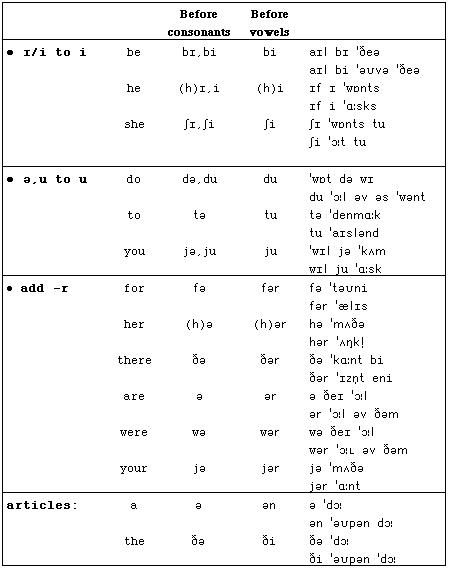NOTE: We will go over this page in class. You will need to attend the class in order to make full sense of it.
Weak Forms 
Tip: This page has a number of internal links. Use your browser's BACK button to retun to where you were.
We have seen that the vowels in UNSTRESSED SYLLABLES can suffer reduction, usually to  , often to
, often to  , and sometimes to
, and sometimes to  . But what happens if the WHOLE WORD is unstressed?
. But what happens if the WHOLE WORD is unstressed?
As we saw in the page on sentence stress, short structural words are often completely unstressed. On of the examples was

In this sentence, the words "at", "has", "she" and "could" are all unstressed, and have weak vowels:









We call these weak forms.
Remember the rules for how to assign sentence stress, and remember that if you have learnt English as an L2, you are likely to have learnt these words in their citation form, which is their strong form - you've learnt to say /fr m/ and /hæz/ instead of /fr
m/ and /hæz/ instead of /fr m/ and /
m/ and / z/.
z/.
 What happens when a strong form becomes weak?
What happens when a strong form becomes weak?
This is a detailed review of the different types of changes which structural words undergo when they become weak. For a complete look-up table of these changes, try this 
 Words which change their strong vowel to
Words which change their strong vowel to 
- Prepositions
at for from of to  5, 14-16
5, 14-16
- Aux verbs
am are can do does had has have must shall
should was were will would  37-39
37-39
- Adverbs conjunctions articles
a an and as but some than that the  36
36
- Pronouns
her them us you your  29
29
 Words which change their strong vowel to
Words which change their strong vowel to  (
( )
)
be been he him his she we  33, 35
33, 35
 Words which change their vowel before vowels
Words which change their vowel before vowels

 H-dropping
H-dropping
- Weak forms which drop their initial h
except at the beginning of utterances
had has had have he her him his  29-35
29-35
 When strong, when weak ?
When strong, when weak ?
Quite often, strong forms are used instead of weak forms. The following is a summary of when strong forms are likely to occur.
(a) Normally weak, but strong when stressed
foregrounding
1 
















 Mary has seen him before
Mary has seen him before

2 


















 Mary has seen him before
Mary has seen him before
3 


















 Mary has seen him before
Mary has seen him before
comparative stress
4 































































This train isn't coming from London, it's going to London
evasion of repetition (deacccenting)
5 
































 he did it for the people of the city
he did it for the people of the city

6 




















































government of the people, for the people, by the people

7 



















































The meal was good, but waiting for the meal was torture

citation forms
8 









 bigger than me
bigger than me
9 


























 How do you spell the word "than"?
How do you spell the word "than"?

10 














































I could do it if you would only stop hassling me
11 





















 I said "could", not "would"
I said "could", not "would"

12 































 I said "the tiger", not "a tiger"
I said "the tiger", not "a tiger"

in front of pauses
(b) weak forms which become strong when final
Prepositions and auxiliary verbs are strong at the end of utterances; pronouns remain weak:
sometimes strong preceeding final unstressed pronoun:
(c) different part of speech
Some words occur as different parts of speech with different stress and vowel quality:
that: weak when relative, strong when demonstrative:
20 






















21 























 -
-

































that's the man that I saw - the house that I bought is that one
22 























































some: weak when indefinite, strong when adjectival:
23 










































there are some people waiting outside to see you
24 



































some people always get on my nerves
there: strong when adverbial, optionally weak when a dummy subject. Can also be weak finally.
25 





























26 


































 (
(


 ...
...


 )
)

(The sound clip gives both weak and strong forms - you may hear either.)
Some verbs can be both auxiliary (weak forms) and main (strong forms):
(d) h-dropping
Words beginning with h- drop the h when weak, but often retain them at the beginning of a sentence
If dropped h leads to V-V, it may reappear:
32 I tried to give her his letter






























33 She did it for her brother























but more often this leads to linking r after  ,
,  ,
,  or
or  :
:
34 




























35 























NOTE: don't drop h's in lexical words!
(e) conjunctions
and, but, than - nearly always weak
(f) auxiliary verbs
37 can: 














 (
(
 )
)







38 will does: 

























































39 must was were: 






























































strong forms finally, like prepositions
strong when main verbs
, often to
, and sometimes to
. But what happens if the WHOLE WORD is unstressed?



m/ and /hæz/ instead of /fr
m/ and /
z/.
![]()
![]()
![]()
![]()
![]()
![]()
![]()
![]()
![]()
![]()
![]()
![]()
![]()
![]()
![]()
![]()
![]()
![]()
![]()
![]()
![]()
![]()
![]()
![]()
![]()
![]()
![]()
![]()
![]()
![]()
![]()
![]()
![]()
![]()
![]()
![]()
![]()
![]()
![]()
![]()
![]()
![]()
![]()
![]()
![]()
![]()
![]()
![]()
![]()
![]()
![]()
![]()
![]()
![]()
![]()
![]()
![]()
![]()
![]()
![]()
![]()
![]()
![]()
![]()
![]()
![]()

before words beginning with a vowel (e.g. "their own"). In GA this weak form occurs before consonants too.
or
.